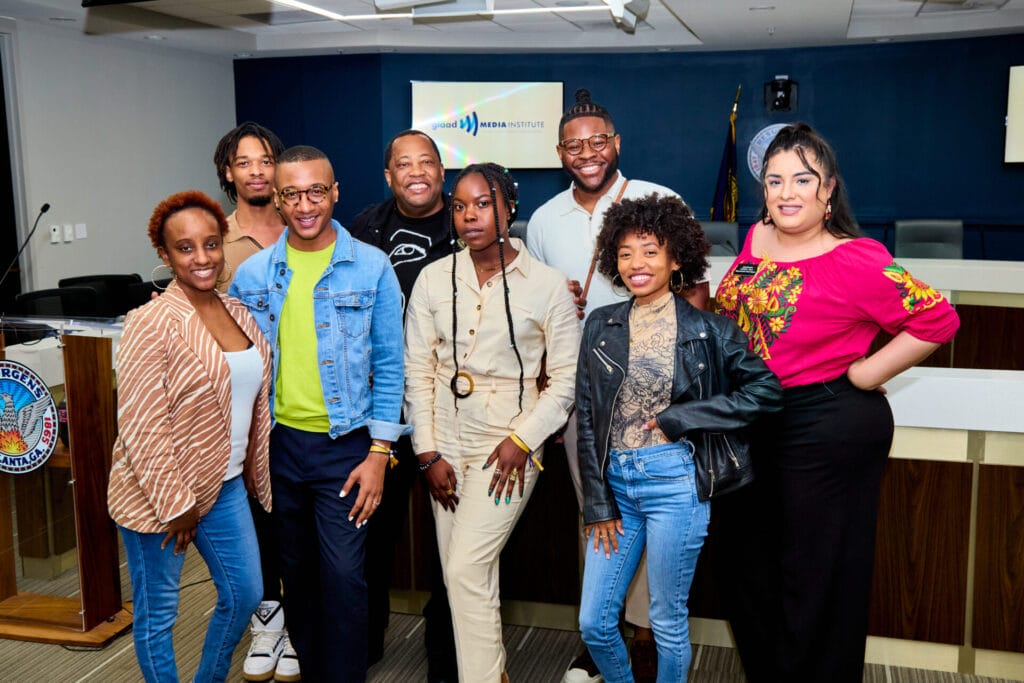Earlier this month, the GLAAD Media Institute, GLAAD’s training, research and consulting division, convened a meeting with local leaders and community advocates in Atlanta, hosted by the City of Atlanta at Atlanta’s City Hall.
Invited participants included respected activists, elected officials, and artists, who learned how to better pitch themselves and speak to journalists about LGBTQ issues of their focus across one of three media training sessions held. One session centered on Latine, bilingual speakers, another on HIV and health, and a third session provided broader coaching for success in interviews with media.
History-making Atlanta City Councilperson Liliana Bakhtiari (D-5)(she/they), was one of the elected city officials who joined the GLAAD Media Institute in the two-day event. Bakhtiari is the first queer Muslim person to be elected in the State of Georgia, and the first nonbinary person elected in the City of Atlanta.
View this post on Instagram
Councilperson Bakhtiari, along with other Atlanta-based LGBTQ activists, chose to speak on record with GLAAD and had much to say about the state of queer Atlantans in the backdrop of such a crucial time for the LGBTQ community.
For Bakhtiari, the fight for the interests of their constituency is personal. “[Their] passion for people abroad, spending her early adulthood fighting for affordable housing, women’s and children’s health, and environmental justice across 26 countries around the world,” their bio bolsters.
Before becoming elected, Bakhtiari worked to enhance the voices of her constituency and tackled tough issues like affordable housing and opposing Atlanta’s “Cop City,” while also tracking anti-LGBTQ bills state-wide.
“Cop City,” as dubbed by its critics, is the future home of a $90 million Atlanta Public Safety Training Center. It’s effectively a police training facility, said to be in used by Atlanta Police and Fire Rescue.
Atlanta Ordinance 21-0-0367, according to the Atlanta City Council, describes an 85 acre-spread of land as one to be leased to the Atlanta Police Foundation, where the public safety facility will be built. Voters were to vote on the training center on a March 12 ballot as a referendum. However, that referendum did not appear, as confirmed by Ballotpedia.
This added community controversy is just one of many issues Bakhtiari is diligently working on, and remains one of their biggest priorities as a member of Atlanta’s City Council.
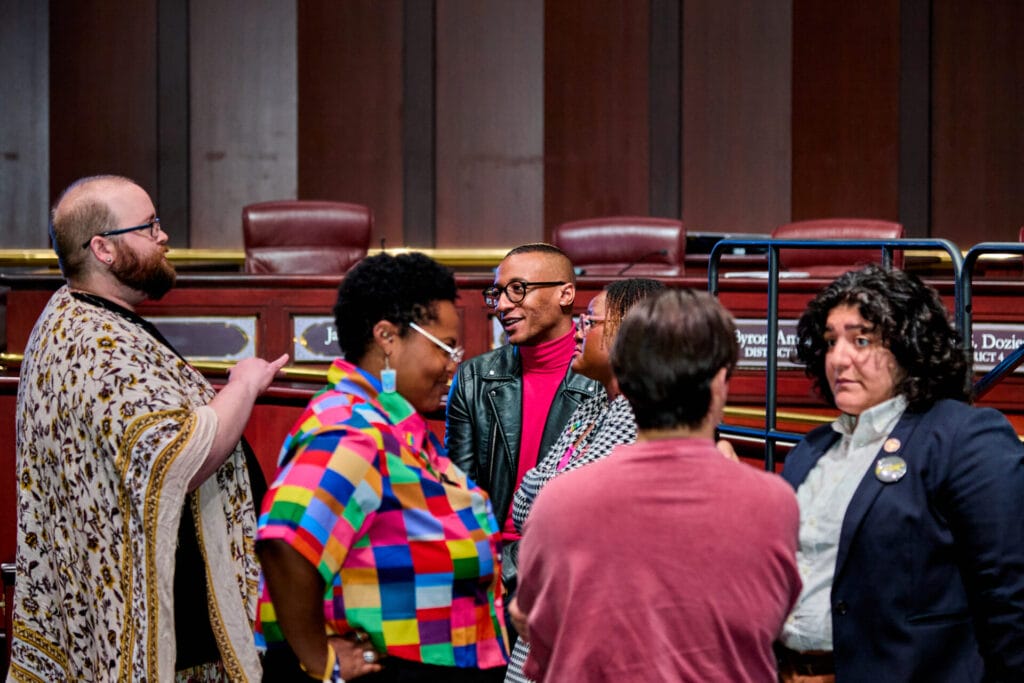
And while there are plenty of issues here at home, it’s clear that the tumultuous events abroad, specifically the current handling of human rights of Palestinians and ongoing situation regarding Israeli hostages in the Middle East, have cast an immensely dark shadow on civic engagement for Atlanta’s LGBTQ community.
For councilperson Bakhtiari, they are leaning on their upbringing and their family’s experience as a guidepost for understanding the scope of what members of their community are feeling right now, as the humanitarian crisis in Palestine unfolds in real time.
A child of an Iranian immigrant, Bakhtiari recalled their father’s refusal to vote in what he considered an “oppressive system.” Bakhtiari reflected with GLAAD about the similarities between today’s climate, clarifying that their father didn’t want to vote for the same people that “drove him out” of his homeland of Iran, where he could never return home to.
“I can’t fault him for that,” Bakhtiari told GLAAD about their father’s choice, even as some of Bakhtiari’s family remain in Iran.
Bakhtiari felt their personal story underlines what they deem as an undeniable correlation to how and why international affairs have emerged as one of the top issues facing LGBTQ communities right now — affairs that have attributed to growing complexities around voting motivation in this year’s General Election, especially for many younger demographics of the LGBTQ electorate, who conflate voting within an “oppressive system” with supporting oppression overall.
Like their father, Bakhtiari believes young people are struggling with this same paradox around voting today: “We have a lot of people that are struggling to understand when youth talk about this,” Bakhtiari admitted. “[Youth] are seeing what is occurring in Palestine.”
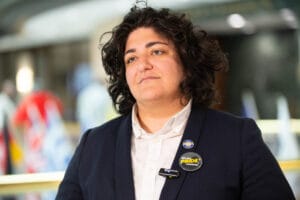
Above it all, Bakhtiari told GLAAD they want voters to come together and see themselves as more than their ballot choices; they also want community leaders, especially elected leaders, to do the work they were called to do and engage with their constituents in meaningful ways, to better understand the issues at hand and how foreign affairs may impact LGBTQ communities at the ballot box.
“If we are going to ask people to vote, stop only talking to people when it’s time for an election. People are more than just their vote,” Bakhtiari reiterated.
According to GLAAD’s 2024 voter poll, LGBTQ registered voters are highly motivated, as the presidential and key congressional campaigns approach, with 94% indicating they are definitely (83%) or probably (11%) voting this November. That level of motivation will prove critical, as history shows when LGBTQ people show up at the polls, LGBTQ communities win.
Yemko Pryor, a graduate student at Emory University also joined GLAAD at Atlanta’s City Hall for GLAAD Media Institute-hosted listening and coaching sessions.
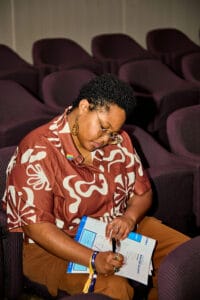
Emory University is one of dozens of college campuses across the country caught in violent crosshairs between pro-Palestinian protestors and police.
Pryor, who also works at Emory to maintain and grow a sense of community for queer graduate students on the Atlanta campus, told GLAAD that task has been further complicated with chaos on campus.
There have been wide reports of students and faculty being “indiscriminately attacked” while camping out on the school lawn, according to Axios.
“The current political climate at campus is obviously really intense and disheartening, but the thing that gives me hope is being able to engage with other graduate students, especially queer graduate students, and even, honestly, undergraduate students as well,” Pryor told GLAAD.
Pryor’s work and visibility on the Emory University campus has never been more important, with dozens of anti-LGBTQ bills introduced this year alone in Georgia.
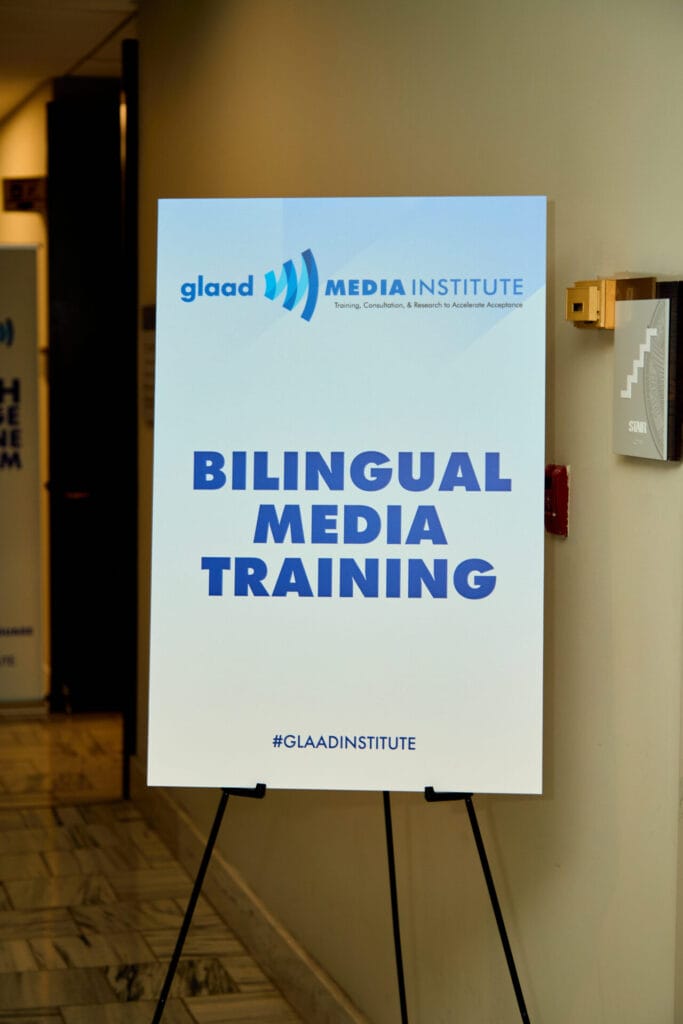
For activist and CEO of Community Estrella, Li Ann “Estrella” Sanchez, these bills take the form of HB 1105, an anti-immigration law, and SB320, an HIV criminalization bill, which, “obviously, also affect us Indigenous communities, communities of color, particularly immigrants, Latino people, and undocumented people,” according to Sanchez.
Sanchez is an Indigenous asylum seeker from Mexico who came to Georgia in search of refuge, security, and safety. Nevertheless, what she found in the US was criminalization for being trans, for being queer, for being Latina, for being Indigenous and for not speaking English. She said that her journey left her incarcerated in a number of ICE immigration jails in what she says is called “the hole” or “punishment cell.”
“Es importante destacar la movilización de nuestras comunidades porque Atlanta ha sido la mecca de una resistencia que viene de un proyecto que se llama ‘una ciudad de policia’ [‘Cop City’] lo que hace es tirar el bosque para construir y extender otro campo de entrenamiento de policía,” said Sanchez.
“It is important to highlight that thanks to the mobilization of activists, thanks to the mobilization of the community who were fighting, and also the legislators who were fighting against all these attacks, all these anti-LGBT proposals in the state of Georgia have died in the process,” Sanchez told GLAAD.
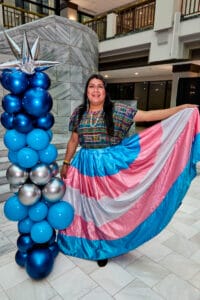
For Sanchez, her story is like so many in her community: “Y por qué estoy conectando yo mi historia? Porque si personas de otros países, de nuestros países de origen están siendo invadidos por estados unidos y venimos a este país y a lo que nos enfrentamos es a ser encarceladas por ser inmigrantes por ser indocumentadas, pero adonde vamos a ir?” Sanchez said.
“And why am I connecting my story? Because if people from other countries, from our countries of origin, are being invaded by the United States and we come to this country and what we face is imprisonment for being immigrants, for being undocumented. But where are we going to go?” Sanchez said.
In a Spanish-language interview conducted at one of the GLAAD Media Institute’s Atlanta City Hall sessions, Sanchez, joined other other activists at the Atlanta gathering in drawing the connection between her community advocacy to that of international concerns. She doubled down and added that the investment in the police force in Greater Atlanta echoed that of the investment of funds to continue the harm of Palestinians.
Sanchez told GLAAD it’s important for her to drive home these deepening dichotomies for community advocates and to create more safe spaces of conversation like this with city, local and federal government leadership amid the ongoing climate.
“We are asking for more investment in communities, in acculturating our communities, that we invest in equitable health, that we invest in everything that the community needs or wants to have, or needs to live a better, full life in the United States,” Sanchez said in Spanish.
Sanchez reminds people that activists and politicians will have to continue to mobilize and fight all and any anti-trans, anti-AIDS/HIV and anti-immigration laws that might be created and passed in the future.
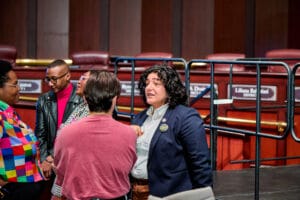
Despite it all, Councilperson Bakhtiari remains hopeful in 2024 and told GLAAD they believe “the system” needs a “reset.” Adding that, “community is stronger than any one individual. And so, bringing and queering-up political space by bringing in our community, to take up space, to humanize perspectives, to make people uncomfortable, to challenge [the] stereotypical, heteronormative – that can change an entire environment.”
Visit GLAAD.org/VOTE to learn more about the GLAAD Media Institute’s role in community convening and what’s at stake for the LGBTQ community at-large this election year.

